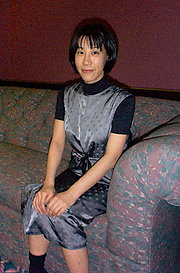
Kanno Yoko interview (continued)
 EX: Last year, Movic
released a COWBOY BEBOP Band Score.
EX: Last year, Movic
released a COWBOY BEBOP Band Score.

KY: Oh, I didn't know that.
EX: Oh ... Besides COWBOY BEBOP, which Band Scores have been released?

KY: I get a lot of requests from fans for
scores for schoolwork and so forth.
EX: Through the internet?

KY: I'm not sure how many through the internet,
but I do get letters. I really don't know about scores being released. I
haven't checked myself if they have been, especially since people might
arrange the music differently than I did. I'm too busy to check, so I don't know.
EX: What are the good points
of composing? For example, the opportunity to travel ...

KY: (laughs) The best point of composing really
is meeting people and musicians all over the world and becoming friends
through music instead of words. I've gone to America, France, Isreal, and
elsewhere. Although I was not able to speak at all at first, if there is a
song ... (laugh) Besides meeting friends, I have the opportunity to record
with and listen to orchestras from within it. I've learned other people's
stories, told my own stories through song, and things we don't understand,
we can understand together. I feel like I become friends with everyone at
the first meeting. (laughs) I'm able to meet so many friends all around the
world all the time. This is the best point.
EX: According to Sunrise, you
will be participating in the theatrical version of ESCAFLOWNE.
For the television series, you composed music with Mizoguchi Hajime. For the
theatrical version, will you be composing new pieces by yourself, or together
with Mizoguchi?

KY: Oh, we will work together. That's the plan.
EX: I received a press release
from Sunrise ...

KY: Really? I haven't seen it yet. (laughs)
EX: You're listed alone in the
music credit though.

KY: Oh, is that so?
EX: As a result, many American fans
were asking, "Why Mizoguchi ..."

KY: (laughs) Isn't on there?
EX: So, you are working
together?

KY: Yes, I think we are working together.
EX: What languages did you use
for "Medicine Eater, "Cat's Delicacy," and "Arcadia"?

KY: Hmm ... which language ... There is only the
image of someone swallowing medicine. (laughs) For "Cat's Delicacy," the image of
a golden-haired lady. As for "Arcadia" ...
EX: Is it Latin?

KY: There is the image of Latin, but the atmosphere of
ESCAFLOWNE is an otherworldly one. It's really not Latin
at all.
 EX: What languages did you use
for "After, in the dark," "Torch song," "SANTI-U," "Pulse,"
"A Sai En," and "Wanna Be an Angel"? They're not real Earth languages, right?
EX: What languages did you use
for "After, in the dark," "Torch song," "SANTI-U," "Pulse,"
"A Sai En," and "Wanna Be an Angel"? They're not real Earth languages, right?

KY: No, they're not real Earth languages. (laughs)
EX: There is a theory among
American fans that it's Zentradi. (laughs)

KY: (laughs) The languages used are not as
interesting (laughs). Each [song] has a different image—for example,
something like Singaporean but not quite (laughs), Bulgarian-like, and various
others. Each one has its own image.
EX: In your opinion, is
American Jazz popular in Japan, compared to America? Indeed, American Jazz's
popularity seems to be waning in America itself ...

KY: Jazz is not really popular in Japan.
EX: I think it is actually
more popular in Japan than in America. In Los Angeles and New York, there is
still popularity, but in various cities in America, there aren't many jazz
clubs, if any. There aren't many magazines either. [Note: Several years
ago, a jazz magazine was published in Japan, highlighting different artists
each month with articles and even a supplemental audio CD.]

KY: There are probably many kinds of jazz:
old-school jazz and so forth. Music invariably comes and goes with the
trends of the times. There are decades when jazz is popular in Japan. By chance,
BEBOP came when it did. Several years ago, jazz was
popular, so the clubs [playing it] grew. Club managers thought jazz was
interesting and started to use it more. Now, though, almost no one listens to
old-school jazz in Japan. There are dedicated people who buy old records
because of their significance, but not actually listen to them.
EX: There is a expression
in America: [In English] "Everything comes in cycles."

KY: That's very true.
EX: I've read your "Pokkari
shita" column in NEWTYPE.

KY: (laughs) I remember those. You can read it
in Japanese?
EX: Yes, I enjoy it.

KY: Oh, you enjoy it? (Laughs) As to how I got
started, The NEWTYPE people said, would you like to
write articles? I said no for three months, but (laughs) I agreed. I usually
write articles on plane trips.
EX: Including when you return
from Anime Expo?

KY: (laughs) I probably will write one then.
EX: You wrote in the July
column installment about Christ as rehabilitation. If you don't mind talking
about it, what is your spiritual or religious life like?

KY: (laughs) I'm not religious at all. But Japanese
don't believe in one God, but in gods everywhere in plants and animals.
EX: Like in Shinto?

KY: That's right. In Japan, Christianity has a
wonderful image. People enjoy the image of Christ and Christianity in picture
books, but not as a religion. (laughs)

Image Copyright © Big West/Macross Project |
